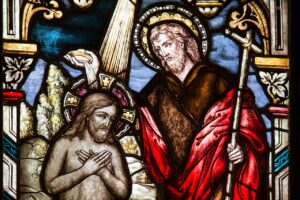2 Maccabees 7:1-2, 9-14; Psalm 17; 2 Thessalonians 2:16-3:5; Luke 20:27-38
For All Saints Sunday: Daniel 7:1-3, 15-18; Psalm 149; Ephesians 1:11-23; Luke 6: 20-31
It seems to hang in the air at this time of year in the northern hemisphere. The decline, or perhaps better, the falling-asleep of nature. Bare branches hovering over rustling piles of dry leaves below. A sense of dying. Memories of those who have passed through and beyond, out of our sight. Old memories, fresh memories, memories we wish we could erase and memories we wish we could hold close forever. Remembrance Day / Veterans Day / Armistice Day.
For some readers of this Reflection, All Saints Day is in the rearview mirror. For others, this Sunday is marked as All Saints Sunday. Some will be hearing a Gospel reading that extols the virtues of those who practiced sainthood in their lives. And others will be hearing a rather different Gospel reading – less about preaching the virtues of humility and more about, what is it we mean when we think about a life beyond death?
A few of us were talking the other day about our experiences of hearing the voice of someone close to us who had died. This might happen in a half-awake state, or at a time of crisis, or while making a crucial decision. I started remembering some of those experiences in my own life, starting with one just a few days ago: lying in bed in the morning, mostly awake, petting the cat, and suddenly hearing my name and “Hello” perfectly clearly. I was hearing not through my ears but in my mind, yet it was not a dream. I suspect most of us have had similar experiences, and may just have thought, “Oh, that’s weird.”
There’s another category of “weird” that involves deceased loved ones in our lives. That’s when some lost object associated with this person suddenly turns up in a place where it shouldn’t be, and there’s no rational explanation. I still think I’ll have to answer to Grandma Roll some day for losing her mother’s wedding ring. I hadn’t been able to find it for several years, and in the meantime I moved in with a friend in her rental home. One morning I came back in my bedroom before leaving for work, and there sat the ring, plop in the middle of the dresser top. My friend had not seen it or touched it. There was no one else in the house. Hans the dachshund couldn’t have gotten up that high. Just – weird.
Jesus answers the Sadducees’ bullying taunt in Luke 20 with some “weird” of his own. The Sadducees were a faction that believed only in what was contained in the Torah, the first five books of the Hebrew Bible. Resurrection or some sort of life after death was only a later development in Jewish thought, so for them it was excluded. They had a vested interest in tripping up this renegade prophet who spoke openly of resurrection. They posed a hypothetical case of “levirate marriage” in which the wife of a deceased man would be given to his brother so that there could be progeny in the dead brother’s name. Jesus undercut the entire premise by saying that, in heaven, there is no marriage. No marriage, because all will be like angels, that is, spiritual beings.
The Sadducees thought that life on the other side would be just like this life, and Jesus points out that the next age will be radically different in nature than the age we know from our own experience, and so will the conditions of life. It will be kairos, God’s time, a time outside of time, and not chronos, calendar time, everyday time. Resurrection is not resuscitation – it is life lived in God’s love, not on our terms and not like anything we can imagine.
Levirate marriage, though attested in the Hebrew Bible for example in the story of Tamar, was probably not practiced in Jesus’ time. The whole thing is hypothetical. What is not, is the idea that a woman is like a piece of property handed on from one man to another for reproductive purposes. Since property would be passed from father to son, the use of the woman’s body meant both protecting inheritance rights and the idea that the man lives on in his offspring. Some Jewish and feminist commentators point out that the system would at least have resulted in a measure of financial security for the widow and a stable place in the patriarchal family. There is a wealth of literature on the dangers of identifying spiritual existence with disembodied, or at least non-female-embodied, life after death.
We can do better. God can do better, for that matter.
“I believe that, when death closes our eyes, we stand in a light for which our sun is merely a shadow.”
Arthur Schopenhauer, philosopher
© Susan K. Roll
Susan Roll retired from the Faculty of Theology at Saint Paul University, Ottawa, in 2018, where she served as Director of the Sophia Research Centre. Her research and publications are centred in the fields of liturgy, sacraments, and feminist theology. She holds a Ph.D. from the Catholic University of Leuven (Louvain), Belgium, and has been involved with international academic societies in liturgy and theology, as well as university chaplaincy, Indigenous ministry and church reform projects.





This is certainly a time when the veil-between-worlds grows thin. All Saints, All Souls, Remembrance day, “bare branches hovering over rustling piles of dry leaves below.” A time of change, a time of memories… As a friend of mine says, a time of “thick listening at thin places” …